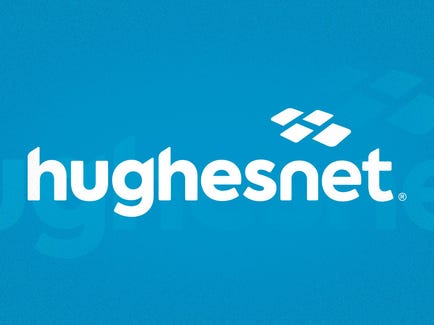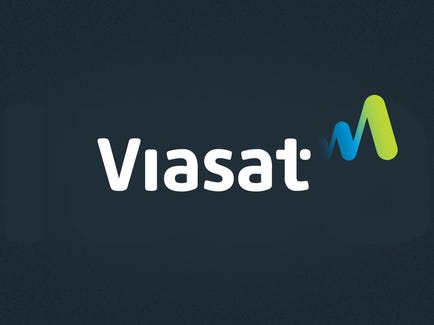Hughesnet vs. Viasat: Clash of Two Satellite Internet Titans
These two major providers may be the only broadband choices for customers in parts of rural America. Which one comes out on top?


Viasat aims to differentiate itself in the satellite internet service provider space with the range of its broadband service plans, going from 25 megabits per second up to 150Mbps, in over 175 cities across the country. Hughesnet was the first satellite internet service to offer broadband speeds of up to 25Mbps, and now, with its new plans, customers can expect download speeds of up to 100Mbps. Sure, it might not match the flashiness of introducing a multi-gigabit plan, but it's not to be underestimated.
For Americans living in rural or less densely populated parts of the US, satellite internet might be the only option for getting online. That's unfortunate because satellite internet is slower, less reliable and less affordable than ground-laid cable or fiber internet. Even outdated technologies like DSL might offer faster speeds at a better value.
Still, established satellite providers can offer service pretty much anywhere, and if nothing else is available, your choice boils down to Hughesnet and Viasat. Elon Musk's Starlink satellite internet is also available throughout the country but is higher in price than Hughesnet and Viasat. Picking between the two might feel like picking between Coke and Pepsi -- a matter of taste between two largely identical products -- but there are some distinct differences you'll want to be well aware of before deciding. Let's have a look.
Locating local internet providers
Hughesnet vs. Viasat overview comparison
| Hughesnet | Viasat | |
| Max speeds | 50-100Mbps download, 5Mbps upload | 25-150Mbps download, 3Mbps upload |
| Lowest promo cost | $50-$80 | $50-$200 |
| Regular monthly cost | $75-$110 | $70-$300 |
| Contract | Two years | Two years |
| Monthly equipment costs | $15-$20 or $300-$450 one-time purchase | $10 or $300 one-time purchase |
| Data allowance | 100-200GB | 60-500GB |
Hughesnet
New speeds and lower pricing
Our take - Hughesnet's new plans offer faster speeds at a lower cost. Hughesnet's maximum download speed now matches its main competitor, Viasat, at 100Mbps for $65-$80, depending on your chosen plan. On top of that, Hughesnet is available to all customers in all remote areas. Hughesnet offers three new plan tiers, with their fusion plan being a combination of both satellite and wireless technologies, offering up to 100Mbps in download speeds and 5Mbps in upload speeds.
Viasat
Pricey, but potentially faster plans with higher data allowances
Our take - Viasat plans cost a bit more than Hughesnet, but they're also likely to come with more data and, in some locations, faster speeds. Viasat data allowances range from 60GB to 500GB, and speed options of 25Mbps to 150Mbps may be available.
Both providers offer service across the country, though HughesNet does a better job covering Alaska than Viasat.
Availability is similar
Hughesnet and Viasat are available across all 50 states, and they're the only major ISPs able to make that claim. That's because satellite internet doesn't depend on ground-laid cable or fiber deployments or the need for a cellular tower. All that's needed is a dish at your home -- to be installed by your provider -- to allow you to connect to satellites orbiting approximately 20,000 miles above the Earth. You should be eligible for Viasat or Hughesnet internet service if you've got a clear view of the southern sky.
Plans and pricing comparison for Viasat and Hughesnet
At first glance, it would appear that Hughesnet and Viasat offer similar plans. This is not the case. Hughesnet's new plans are cheaper and nearly match up to Viasat's maximum speeds. Still, Viasat's top plan is faster than the best selection from Hughesnet. Let's dive into the details a bit more.
Locating local internet providers
Hughesnet plans and pricing
| Plan | Max speeds | Starting price per month | Price after 12 months | Contract terms | Equipment costs | Data allowance |
|---|---|---|---|---|---|---|
| Select Plan | 50Mbps download, 5Mbps upload | $50 | $75 | Two years | $15 a month or $300 one-time purchase | 100GB |
| Elite Plan | 100Mbps download, 5Mbps upload | $65 | $90 | Two years | $15 a month or $300 one-time purchase | 200GB |
| Fusion Plan | 100Mbps download, 5Mbps upload | $80 | $110 | Two years | $20 a month or $450 one-time purchase | 200GB |
Viasat plans and pricing
| Plan | Max speeds | Starting price per month | Price after 3 months | Contract terms | Equipment costs | Data allowance |
|---|---|---|---|---|---|---|
| Choice 25 | 25Mbps download, 3Mbps upload | $50 | $70 | Two years | $10 a month or $300 one-time payment | 60GB |
| Choice 50 | 50Mbps download, 3Mbps upload | $70 | $100 | Two years | $10 a month or $300 one-time payment | 100GB |
| Choice 75 | 75Mbps download, 3Mbps upload | $100 | $150 | Two years | $10 a month or $300 one-time payment | 150GB |
| Choice 100 | 100Mbps download, 3Mbps upload | $150 | $200 | Two years | $10 a month or $300 one-time payment | 300GB |
| Choice 150 | 150Mbps download, 3Mbps upload | $200 | $300 | Two years | $10 a month or $300 one-time payment | 500GB |
One of the first things you'll notice is that the promo period for Viasat is significantly shorter than the 12 months you typically get with most cable and fiber providers. Hughesnet distinguishes itself in this manner by bumping its price up to $25-$30 after a year. Viasat offers promo pricing for only three months before kicking things into pricier gear -- and with the fastest plan, the price jump is a staggering $100.
Viasat gives customers more speed options
When it comes to the fastest speed available, Viasat tops Hughesnet. The Choice 150 plan has a maximum download speed of 150Mbps for $200 monthly in the first three months. The Choice 100 plan tops out at 100Mbps for $150 a month in the first three months. Hughesnet falls just behind in speed, with its fastest speed being 100Mbps, falling short of Viasat's top end.
Viasat's faster plans aren't available everywhere. Although it boasts a 150Mbps plan, the top speed tier available in some areas is the 25Mbps plan. Meanwhile, the 50Mbps you get from Hughesnet is available across all serviceable areas, allowing Hughesnet to boast that it can provide broadband speeds to all customers in all its regions.
Just keep in mind that the Federal Communications Commission's current definition of "broadband" (25Mbps download, 3Mbps upload) was formulated in 2015, making it an outdated benchmark for modern internet usage.
Viasat and Hughesnet share a sketchy idea of unlimited data
Hughesnet touts its "unlimited data,'' and Viasat even puts "unlimited" in the plan names -- but both providers are playing fast and loose with the term.
In the case of Hughesnet, there are indeed no hard data limits. This means you won't be cut off or face overage fees if you go over your monthly data allowance. That said, you will experience slowdowns once you hit your monthly data cap. Specifically, customers who exceed the monthly data cap can expect their download speeds to be throttled for the remainder of the month.
It's a similar story over at Viasat. The company won't charge you additional fees for exceeding the data limit, but you will suffer from severely reduced download speeds for the remainder of that month.
It's tempting to give Viasat the nod here because the data caps for each plan are higher than those you'll get with Hughesnet. For example, Viasat's Choice 150 plan has 300GB of data, while Hughesnet's plan features 200GB. Also, Viasat has a Data Extender feature that allows you to change your video quality -- from the typical 720p to 480p -- to help lower your data usage. Let me throw out a couple of caveats, as well.
First, like the speeds, Viasat's data allowances can vary from region to region. Meanwhile, Hughesnet's data caps are consistent across the entire coverage map. Hughesnet customers can also buy Data Tokens, adding gigabytes to their monthly cap. Again, Viasat doesn't match that.
It's a close call, but I'm inclined to give a slight edge to Hughesnet, although the totals are lower when it comes to a data comparison. Both providers have data limits that can be tough to live with, but Hughesnet presents consistency across its plans and opportunities to purchase more data if needed.
Additional fees are steep, but Viasat's are slightly cheaper
One of the necessary evils of satellite internet service is a higher equipment fee than you'll see with cable, DSL or fiber. For example, most cable providers will allow you to skirt the monthly modem/router fee by using your own equipment, but neither Hughesnet nor Viasat gives you that option. Let's take a closer look at what you can expect.
One-time installation fee
Self-installation isn't an option with either of the major satellite internet providers. With Viasat and Hughesnet, it's professional installation only, requiring a technician visit and setup of the satellite dish and equipment. Viasat offers professional installation at no cost for new customers. Hughesnet, on the other hand, is a bit tricky. Hughesnet offers free installation if you choose to lease your equipment, which comes at $15 monthly. If you choose to purchase your equipment, standard installation will cost you $200.
Unless you want to buy it for a steep upfront fee, you'll need to pay $13 per month to rent your equipment from Viasat -- and installation costs $100, too.
Additional monthly equipment fee
As I mentioned above, you won't be able to use your own modem with either Hughesnet or Viasat. Instead, you'll need to rent or pay for your equipment upfront. With Hughesnet, that means another $15 per month to lease the Hughesnet Wi-Fi Modem, although you can also buy the equipment for a one-time fee of $300, which includes the installation fee.
Viasat takes a similar approach but charges customers $10 monthly to rent its Wi-Fi equipment. If you want to go the route of buying the equipment upfront, you'll be charged a one-time fee of $300. That isn't chump change.
Contracts and early termination fees
Both Hughesnet and Viasat require a two-year contract. With Viasat, if you cancel before the contract is up, you'll need to pay an early termination fee of approximately $15 for every month remaining on your contract. In the case of Hughesnet, the amount could be as steep as $400 if you cancel within the first 90 days of service.
Viasat does offer the option of forgoing the two-year contract by paying a $300 upfront fee at the start of the service. This will save you $45 if you decide to cancel after the first 30 days of your service. Not much to write home about.
Though Viasat wasn't scored at all, HughesNet finished dead last in J.D. Power's most recent ISP customer satisfaction survey for the US South region.
Customer satisfaction is a mixed bag
The 2023 American Customer Satisfaction Index for ISPs didn't include separate scores for satellite providers like Viasat and Hughesnet. While the ACSI confirmed to CNET that scores for both providers were included in the overall rankings, it's impossible to pull out their individual numbers. As an industry, the numbers weren't pretty this year, but it isn't easy to know exactly what that means for either of our satellite providers.
Unfortunately for Hughesnet, the 2023 J.D. Power US Residential Internet Service Provider Satisfaction Study did highlight it in the study's South region. The company earned a disappointing score of 577 on a 1,000-point scale, dead last among all ISPs listed in that same region. This isn't necessarily surprising given satellite internet's reputation for spotty service. The technology is known to be finicky in bad weather, sluggish in performance and expensive compared with other modes of internet.
It's one of the main reasons billionaires like Elon Musk and Jeff Bezos have invested in low-earth orbit satellites, which are approximately 60 times closer than those in use by Viasat and Hughesnet. With satellites closer to the ground, the signal from your dish won't need to travel as far, which can potentially reduce latency and boost speeds.
What's the bottom line on Hughesnet vs. Viasat?
So, did you choose Coke or Pepsi? If you reside in a remote stretch of rural America, your only choices for internet service may be Hughesnet and Viasat. While Hughesnet's consistency across all corners of the coverage map makes for a decent pitch, the chance for higher download speeds and greater data allowances tilts the scales toward Viasat. Be sure to check with both to see which one is the better fit at your address -- and if anything else is available, be sure to consider that as well.
Hughesnet vs. Viasat FAQs
Which is faster, Hughesnet or Viasat?
If you match them up, based simply on which service has the fastest speed at its top end, then the clear winner is Viasat. Some of its markets are now able to reach 150Mbps download speeds. That said, not all Viasat customers have access to that top download speed. There are some markets where subscribers will see maximum speeds of 12Mbps. In those cases, Hughesnet comes out on top because all of its markets have access to 50Mbps download speeds.
Do Hughesnet and Viasat have data caps?
Both Viasat and Hughesnet play a little fast and loose with the term "unlimited data." Yes, neither indeed enforces a true data cap because customers won't be charged overage fees or cut off from service once they hit their monthly data allowance. Once that data limit is hit, customers will experience a severe slowdown in internet speed, including throttling for the remainder of their billing cycle. You may avoid taking a hit to your budget, but you'll certainly get a punch to the gut when it comes to the performance of your internet connection.
Can you game with Viasat and Hughesnet?
For Hughesnet, it all depends on the plan that you choose. Hughesnet's Fusion plan which is a combination of satellite and wireless technologies allows for lower latency and supports online gaming. With Viasat, you could try it, but we wouldn't recommend it. If you want to play chess or solitaire, you might be in business, but any first-person shooter games, multiplayer matches or real-time strategy contests would be difficult.
Home Internet Guides
- Sometimes a provider is available in your Zip code, but not at your exact address
- See what exact plans are available at your home


